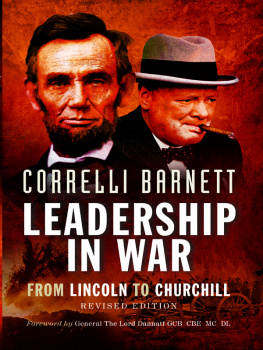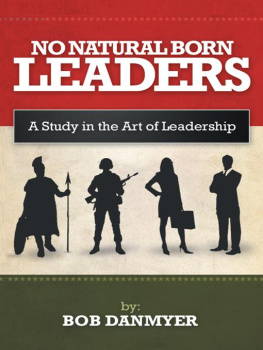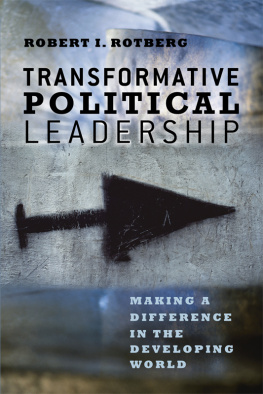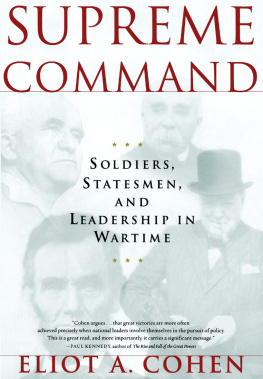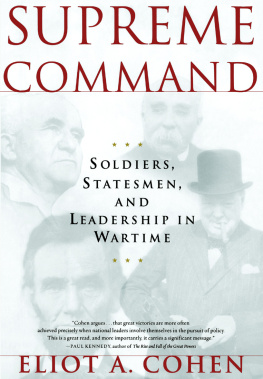LEADERSHIP IN WAR
FROM LINCOLN TO CHURCHILL
Revised Edition
Correlli Barnett
Foreword by
General The Lord Dannatt
GCB, CBE, MC, DL

First published as The Lords of War: From Lincoln to Churchill
in Great Britain in 2012
Revised paperback edition 2014 by
The Praetorian Press
an imprint of
Pen and Sword Books Ltd
47 Church Street
Barnsley
South Yorkshire S70 2AS
Copyright Correlli Barnett, 2012, 2014
ISBN 978 1 4738 2122 4
The right of Correlli Barnett to be identified
as the author of this work has been asserted by him in accordance
with the Copyright, Designs and Patents Act 1988.
A CIP record for this book is available from the British Library.
All rights reserved. No part of this book may be reproduced or transmitted
in any form or by any means, electronic or mechanical including photocopying,
recording or by any information storage and retrieval
system, without permission from the Publisher in writing.
Printed and bound in England
by CPI Group (UK) Ltd, Croydon, CR0 4YY
Typeset in Times New Roman by
CHIC GRAPHICS
Pen & Sword Books Ltd incorporates the imprints of
Pen & Sword Aviation, Pen & Sword Family History, Pen & Sword Maritime,
Pen & Sword Military, Pen & Sword Discovery, Wharncliffe Local History,
Wharncliffe True Crime, Wharncliffe Transport, Pen & Sword Select,
Pen & Sword Military Classics, Leo Cooper, Remember When,
The Praetorian Press, Seaforth Publishing and Frontline Publishing.
For a complete list of Pen and Sword titles please contact
Pen and Sword Books Limited
47 Church Street, Barnsley, South Yorkshire, S70 2AS, England
E-mail:
Website: www.pen-and-sword.co.uk
For my sons-in-law
Ardeshir and Martin
List of Plates
Foreword
General The Lord Dannatt GCB CBE MC DL
Chief of the General Staff 20062009
Constable of Her Majestys Tower of London
A fter a lifetime as historian and writer Correlli Barnett has produced his most accomplished book to date. Leadership in War is no ordinary book on military leadership; it is an extraordinarily privileged examination of command in war at the highest level. The individuals whom Barnett has chosen to illuminate are not all generals, admirals and air marshals but include an emperor, a president, two prime ministers and a dictator. This book is truly about command at the highest level and that essential relationship between those who lead and those who follow recognition that leadership and follow-ship are the two sides of the same coin. And this examination of command is a privilege for the reader to savour, drawing as it does on Correlli Barnetts lifetime of scholarship.
The brilliance of this book is signposted in the authors introductory essay on the nature of leadership. In the final paragraph of his introduction, Barnett concludes that the secret of leadership lies not in managing human resources, but in cherishing human relationships. In the chapters that follow he tests this thesis in limited war, coalition war and total war, from the perspectives of military and civilian leaders alike. In the nineteen chapters that comprise the book, one famous or infamous career after another is distilled with great clarity and skill into a refreshingly focused conclusion that leaves the reader in no doubt about the particular trait of character that Barnett has highlighted to pursue his argument. From Napoleon Bonapartes realisation that to succeed he had to feed his army with success almost regardless of the strategic consequences, through Lincolns struggle to find a general with whom he could do business and on to Churchills determination to achieve victory at all cost, this book is a grand march through the nineteenth and twentieth century experiences of war in all its energy and ferocity. Every chapter adds to the strength of Barnetts original thesis.
Perhaps the apparent surprise is the absence of a concluding essay drawing the threads of the work together. The tidy mind has always sought a beginning, a middle and an end to any enterprise, but Barnett dignifies both himself and the reader by allowing the text to finish at the conclusion of the nineteen studies. Although the study of Churchills leadership to victory is very appropriately thefinal offering, the penultimate study of Adolf Hitler Spellbinder and Fantasist validates Barnetts thesis most vividly. After the easy victories of 1940 the German people would have followed Hitler to hell and back, but when the gates of hell beckoned the German people were abandoned by their leader. As Barnett comments, for Hitler the German peoples existence was only justified by their usefulness as instruments of his personal ambition. To paraphrase Winston Churchill, never in the field of human conflict had a people been abused for so long by a leader determined to fulfil his own selfish wishes. With judgements such as that, Correlli Barnett quite properly refrains from a concluding essay leaving the reader the privilege of drawing his or her own conclusions. Such an ending is a tribute to the authors brilliance. This book is a most compelling read for the military historian and the general reader alike. It is Correlli Barnett at his vintage best.
Preface
T he theme of the present work is the decisive effect on history exerted by individual human leadership. The background, in sharp contrast, lies in the profound political, social and technological changes that took place in the world between the outbreak of the American Civil War in 1861 and the conclusion of the Second World War in 1945.
The civilian and military leaders portrayed in this book have been chosen because they offer a rich diversity of personal character, national culture and style of command; and because their careers encompass limited war, coalition war and total war, as well as campaigns of brilliant manoeuvre and campaigns of bloody attrition.
For the historian, with his priceless gift of hindsight, it is fascinating to study these men locked in struggle with great events, in moments of clear-sightedness and self-delusion, of despair or unbreakable resolve. And for the leaders of today, in whatever walk of life, there is much to learn from the examples of the leaders of the past.
Introduction
The Nature of Leadership
I n a memorable passage in his book On War, Carl von Clausewitz describes the role of a commander in a long, hard battle:
As long as his men, full of courage, fight with zeal and spirit, it is seldom necessary for the Chief to show great energy of purpose in the pursuit of his object. But as soon as great difficulties arise and that must always happen when great results are at stake then things no longer move on of themselves like a well-oiled machine, the machine itself then begins to offer resistance, and to overcome this the Commander must have a great deal of force of will. As the moral forces in one individual after another become prostrated, the whole inertia of the mass gradually rests its weight on the Will of the Commander; by the spark in his breast, by the light of his spirit, the spark of purpose, the light of hope, must be kindled afresh in others.

